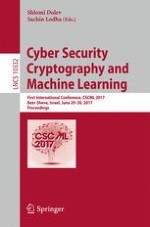2017 | OriginalPaper | Buchkapitel
Building Regular Registers with Rational Malicious Servers and Anonymous Clients
verfasst von : Antonella Del Pozzo, Silvia Bonomi, Riccardo Lazzeretti, Roberto Baldoni
Erschienen in: Cyber Security Cryptography and Machine Learning
Aktivieren Sie unsere intelligente Suche, um passende Fachinhalte oder Patente zu finden.
Wählen Sie Textabschnitte aus um mit Künstlicher Intelligenz passenden Patente zu finden. powered by
Markieren Sie Textabschnitte, um KI-gestützt weitere passende Inhalte zu finden. powered by
